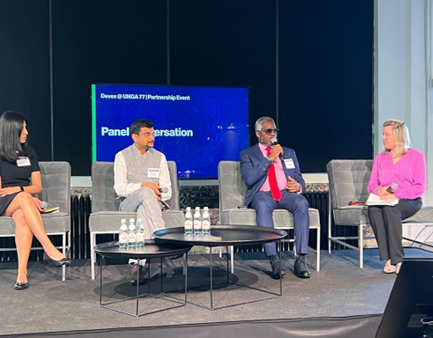The Director-General present at Devex @ UNGA Panel
The Director-General, DSCHC, Dr. Ben Nkechika, was a panelist at the Devex @ United Nations General Assembly (UNGA) 77 event which held on the 21st of September 2022, speaking on ”Strengthening systems for safer childbirth through locally led solutions”. Other members of the panel were Niranjan Saggurti - Managing Director, Population Council Consulting Private Limited, Natasha Sunderji - Global Health Lead, Accenture Development Partnerships, and hosted by Devex Managing Editor, Anna Gawel.
On his response to his implementation of SDG 3 which is, to ensure healthy lives and promote well-being for all at all ages, the Director-General stated that the most vulnerable people (pregnant women and children under the age of 5) are the primary focus of goal 3, as they make up a significant part of the health index for the country.
He shed light on some of the many issues faced by the vulnerable, one of which is that women are at higher risk due to the fact that the older male population frequent the urban areas in order to provide for their families back home. This gap led to the Access to Finance program, with the goal of promoting private intervention in bridging this gap.
He also mentioned how pregnant women enrolled into the Delta State Contributory Health Scheme, who have gone through their antenatal sessions, would end up not showing up for their eventual delivery.
There were various attempts to find out why that was happening, but the breakthrough came when the DG hosted a football match for the children in the same community. It was during this match that it was discovered that the women failed to show up for delivery because they believed that evil spirits could be transferred into their baby during childbirth. Hence women in labor could only be attended to by the traditional healer.
This problem was solved by the injection of a senior matron, with ‘spiritual powers’ of her own into the community. What this meant was that women could have their babies safely under adequate medical supervision, while still holding their beliefs dear.
As a conclusion to this instance, Dr Ben Nkechika further emphasized the need for an adaptive healthcare system as not all systems work across all communities. There is a need to peculiarize each solution to the environment.
He also spoke on healthcare challenges leading to poverty/debt, stating that the DSCHC strategy for avoiding such is that they have set a mandate to facilities that states that “if anybody is able to walk into a healthcare facility and is unable to afford the care, provide care, the health insurance will pay for it”.
He also shed some light on the collective nature of the Delta State Contributory Health Scheme, stating that it covers “maternal care, health education, contraception, mental healthcare, post op management’ and lots more within one scheme package.
On what he expected from the UNGA, the DG suggested that more panels like these should be setup, where real life breakthroughs in healthcare are shared for others to put into practice for better outcomes.
Unchaperoned male circumsision was also a profound problem for the community as it led to infant sepsis and death. To avoid this, the community stopped the practice all together. With the intervention of DSCHC, safe circumsistions are being done in the community. Since then there hasn’t been a single loss of any mother within that community.

